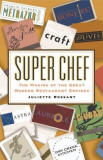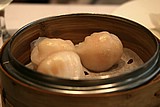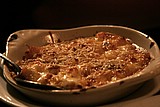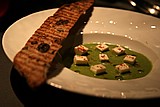Home |
Restaurants by City
|
Food Photography |
Archive | Philosophy |
![]()
Right now we are eating in Seattle, Washington.
|
Thursday
2004
Permalink
|
A few months ago I agreed to check out Super Chef, The Making of the Great Modern Restaurant Empires, by Juliette Rossant. I generally avoid spending a ton of time writing about things I don’t really enjoy, but I feel like there are some important things to learn from Super Chef. More on those later. Firstly, the title. Super Chef. Already I’m slightly irritated as I don’t really know what it means. It’s not that I have a problem with calling out certain chefs as superlative. Certain chefs deserve those accolades. It may just be my perception, but calling the top celebrity chefs “Super Chefs” seems slightly affected, and feeds into this notion that a) you have to be a celebrity chef to make great food, or b) all celebrity chefs make great food. I admit this may just be me being oversensitive, but I can’t help the way I reacted to the title. The book covers several chefs: Wolfgang Puck, Charlie Palmer, Todd English, Milliken and Feniger, and Tom Colicchio. The first thing that struck me was that I’d eaten at five of these chefs restaurants (Chinoise and Wolfgang Puck Express, Aureole, Border Grill, and Craft) and had mediocre meals. Now I have no doubt that each of these Chefs in their own right can cook up a storm. But this is in fact the point. These chefs create food experiences with their names on them, and yet the quality of the food (that I experienced) paled in comparison to what the namesakes of the restaurants can make with their own hands (I assume). And ironically, this really was the theme of the book for me. Read on as Juliette Rossant tells the story of six chefs who used to make great food and now are too busy running their “modern restaurant empires” to do any actual cooking. These chefs swear up and down that their contribution to their empire is strict quality control. There are passages describing how meticulously the “super chefs” train their chefs who cook under their name in other cities. But after a) eating in some of their restaurants, b) reading sections describing the details of Wolfgang Puck lending his name to a line of canned soups, and c) hearing about chefs show up once or twice a year to train staff on a cruise ship, or making airline food, the entire affair simply sounds unappetizing. I'm not saying I have a problem with canned soup, or food on cruise ships. I just started to wonder, what really was the Wolfgang Puck "experience" if you could put it in a can? In some ways the book reminded me of the tv show “The Restaurant”. It was contrived but fun “drama”, but most disappointingly, the food did not look appetizing. Though I watched the show I had no urge to go eat at Rocco’s. The same was true of the book. Though I read it, I had no desire to eat at any of the restaurants described in its pages. So halfway through reading the book and thinking about how uninterested I was in eating any of Wolfgang Puck or Tom Colicchio’s “fast casual” food, I realized that Juliette Rossant was a business reporter. This book wasn’t about food, it was about the business of food. Fine. I like reading about business. I reframed my expectations for the book and read onward. And again, I was disappointed. As unappetizing as the food sounded, the business practices of many (not all) of the “Super Chefs” in question often seemed random and dopey. None of the chefs seemed to be super impressive business people from the descriptions in the book. Many of them, Milliken and Feniger and Todd English specifically, seemed to make every step in the restaurant business a painful misstep. From growing too quickly, to making naïve decisions about personnel, to getting enamored with their own celebrity, etc. I'm not saying they are bad business people, I'm saying that this is the impression I got from the book. Super Chef was neither an exciting behind-the-scenes look at the food that built these careers, nor was it a particularly illuminating view into innovative and consistently successful businesspeople. I read the whole thing, so you don’t have to. I wish the book had gotten either more hardcore about the detail of the food (and the quality of that food) that it described, or focused on people who really were business leaders you could look up to. I suppose since I have yet to either cook or run a business as well as any of the people covered in the book, people may question my judgment. That said, I can read, and from what I read, the book did seem neither a food book nor a business book to me. In the end, whether it was the awkward writing, the impression that I got that the author was trying to sound objective but was really enamored of her subjects (pick one please), or the fact that I never knew whether I was supposed to be excited about the food or the business of food, the book felt to me like the food and chefs it was describing – a lot of stuff thrown together to see what would stick. It's funny but if only the premise had been different, I might have actually enjoyed reading the book. The theme that kept hitting me over the head as I read the book was how incompatible expertly hand-crafted food and large-scale business seem to be. I would really have loved to understand not just how chefs have failed to scale their business while maintaining quality, but understand much more about some of the successes (if there are any). Now that would be interesting, and understandable.
|
|
Our Sponsors
Online Loans – Conversion Strategies – College Courses – Surprise Birthdays – Online Trading - Calendar and Event Schedules - Food Events and Calendars - Wine Events and Calendars - Digital Photography Resources - Jewish Gifts and Judaica - Howard Stern Podcast ponytailed blogger Jonathan Schwartz

Browse tastingmenu
Home |
Restaurants by City X |
Food Photography |
Archive | Philosophy |
![]()
Free eBooks: All About Apples
| Autumn Omakase
More:
Discussion |
Cool Food T-Shirts |
Ingredients
| Markets |
Recipes
Search |
Blog FAQ |
Other
Blogs
Best of tastingmenu
|
City View
Entry: July 6, 2006 |
Blue Plate
Entry: June 19, 2006 |
L'Atelier de Joël Robuchon
Entry: July 18, 2006 |
Browse by City
Boston | Chicago | Houston | Las Vegas | Los Angeles | Maui | New York | Philadelphia | Portland | San Francisco | Seattle | Toronto | Utah | Vancouver | Washington D.C.
Bangkok | Beijing | Hong Kong | Seoul | Tokyo
Amsterdam | Berlin | Italy | London | Madrid | Paris | Vienna
Browse by Month
2006
2005
2004
2003
2002
2001
Comments, questions, or feedback:
info / at / tastingmenu / dot / com
All pages Copyright (c) 2001-2006 tastingmenu.com
Last modified 11/27/06.




